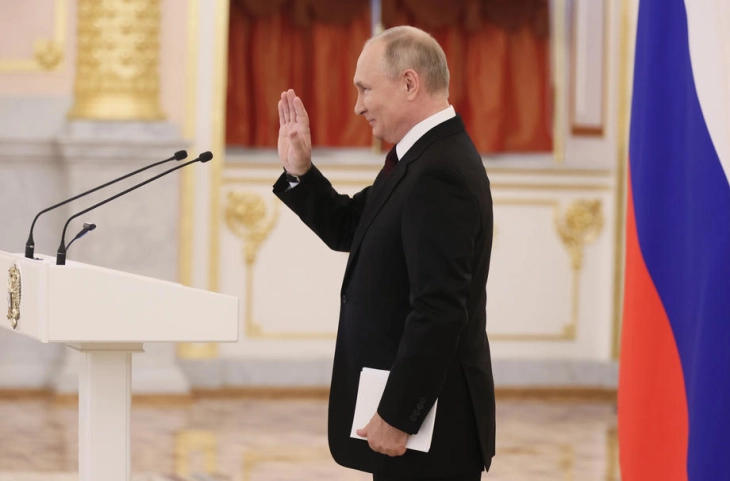Russia tells NATO not to roll out east as Kiev asks for military help

Moscow/Riga/Kiev, 1 December 2021 (dpa/MIA) - President Vladimir Putin demanded "guarantees" that NATO would not strengthen its presence near Russian borders on Wednesday, with Kiev and the Western military alliance increasingly concerned about a fresh bid on Ukrainian territory.
"We will be insisting on concrete agreements, which exclude any possible NATO expansion to the east, and the deployment of any weapons that threaten us and are deployed in the approximate vicinity of the Russian territory," Putin said during a meeting at the Kremlin with foreign diplomats.
His comments came the same day Ukrainian Foreign Minister Dmytro Kuleba asked NATO allies to to help stave off a potential Russian incursion with strong political signals, the preparation of economic sanctions and more military backing.
"If we act in a coordinated fashion, we will be able to deter President Putin and to demotivate him from choosing the worst case scenario, which is a military operation," Kuleba said at NATO talks in Riga.
On Monday, Kuleba alleged that there were now 115,000 Russian troops stationed near the border. These figures could not be independently verified.
Moscow annexed the Ukrainian peninsula of Crimea in 2014 and also backs pro-Russian separatists in Ukraine's eastern regions of Luhansk and Donetsk, known collectively as Donbas.
According to UN estimates, about 13,000 people have died there since the conflict began seven years ago.
Kiev is not part of NATO, but is a close ally and is supposed to eventually join the 30-member military pact. NATO supports the Ukrainian armed forces with training and equipment.
NATO states, including the United States, also indicated this week they would be prepared to resort to fresh economic sanctions if Moscow were to send troops over the border. Western countries already slapped punitive measures on Russia over the Ukraine conflict.
US Secretary of State Antony Blinken said Washington had "made clear that we will respond resolutely, including with a range of high impact economic measures that we have refrained from pursuing in the past."
"I'm not going to spell those out to you today, but what I can tell you is this we shared our thinking with allies and partners," he told reporters.
NATO foreign ministers meeting in Riga agreed that Moscow would be made to pay a high price for any aggression on Ukraine, alliance leader Jens Stoltenberg said Wednesday.
While increased military assistance was possible, a direct military intervention by NATO in case of an invasion was not on the cards, he said. Ukraine is not part of NATO so allies are not treaty-bound to defend the state, secretary general Stoltenberg noted.
It also remains to be seen whether Russia would indeed risk such an escalation.
Putin expressed concern Wednesday that NATO infrastructure had stretched quite close to Russian territory, and that Ukrainian forces have massed their armies near territory controlled by pro-Russian militias in the country's east.
Ukrainian President Volodymyr Zelensky meanwhile spoke out in favour of direct negotiations with Russia to resolve the ongoing conflict in eastern Ukraine.
"We must acknowledge the truth that we cannot end the war without direct negotiations with Russia," Zelensky said in his annual state-of-the-nation address in parliament on Wednesday.
In a provocation to Ukraine, Belarusian President Alexander Lukashenko - a close ally of Moscow - recognized the annexed Ukrainian Black Sea peninsula of Crimea as Russian for the first time after a long period of hesitation.
"Crimea is ... de facto a Russian Crimea," Lukashenko said in an interview with the Russian state agency Ria Novosti, excerpts of which were published on Wednesday.







